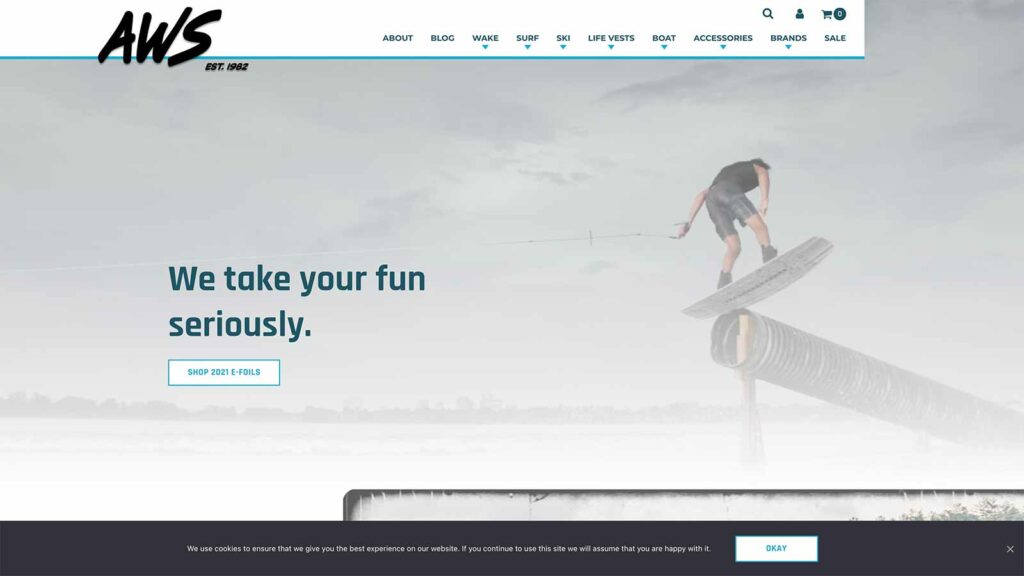When to use a website cookie policy seems to be one of the areas we get questions about fairly often when building a new website. Over the past few years, our data, personal privacy, and the information footprint we leave as we move across the internet have become of supreme importance to most people.
What Are Website Cookies?
Cookies are small pieces of code that can store general information about a person’s website visit. Most often, this data is stored in your browser for later use. It helps speed up access by storing passwords, preferences, etc., that will be needed on subsequent visits. The data cookies store is most often innocuous – small bits of information that help a website manage a person’s session. How about a couple of examples?
Ever go to an online store, drop something in a cart, and leave the site without finishing the purchase? When you come back a week later, you notice the products are still in your cart. That’s cookies.
A more specific example would be when you go to a site, create a login for your new account, and then return later, and the site still remembers your login information. Yup, that’s cookies.
What Does a Website Cookie Policy Do?
The interest around cookies and cookie policies has to do with the fact that your website is creating the need to store those tiny bits of user data for later use, and that information is technically personal data — a scorching topic at the moment.
As consumers and digital migratory users of the web, we have the right to know 1) when data about us is being stored and 2) how that data is being used. A cookie policy focuses specifically on that #1 concern listed above. #2 is generally handled by a privacy policy stored on your website.
What Does a Website Cookie Policy Look Like?
A cookie policy will most of the time show up in the form of a simple banner either at the top or bottom of the first page on a site you visit. When you accept the cookie policy, the bar goes away, and guess what? It stores a cookie that lets the site know you’ve already clicked on the policy, so it does not show up again on subsequent visits to the site.

What Are the Advantages of Using a Cookie Policy On My Website?
As mentioned in my mini list in the last paragraph, the #1 concern a cookie policy addresses are letting your users know that information about their visit will most likely be saved for future use. The user has the right to accept that reality by clicking on an “I agree” button, or if it is a concern to them, they have the option to leave the site. Your responsibility is to inform the user; the choice then becomes theirs.
While currently, California here in the U.S. has a series of robust laws regarding the privacy of persona data, most states are still in the formation period of these laws, and they do not generally have any hard and fast rules. They are coming, though. Personal data and its use is a very heated topic, as it should be. Users want to know when data is being stored about them and the assurance that it is not being used for any nefarious purposes. And that is understandable.
Is Setting Up a Website Cookie Policy Costly?
Most of the time, no. If you are using a Content Management System (CMS), like WordPress or Joomla, you can most likely find a plug-in that will allow you to install it pretty easily. If you’re using Squarespace or another website builder service, it might just be the click of a button. If you hire a web designer to do it for you, it is not a time-intensive task generally.
In the End, Why Should I Consider a Cookie Policy for my Website?
Using a cookie policy comes down to supporting the rights of your users, respecting their concerns about how their private data is used, and ultimately, could be said to reinforce the user experience of your site visitors.
User experience is about reducing the cognitive load of your visitors so they can accomplish their goals quickly and then move on to other things. If protecting personal data is a goal, then including a cookie policy is ticking off that box to make your website be a solid experience for everyone who comes to it.
Finally, as I stated earlier, most states here in the U.S. are not requiring a cookie policy by law. Europe, however, is a different story. They have several laws that make things like cookie policies and privacy policies a matter of requirement. Here in the U.S., it’s not a matter of if, but when on this topic. Early adopters saw the way things were going overseas and quickly started implementing them here in the States. Now it’s become standard practice.
In the end, a website cookie policy is a good idea. Respecting the rights of our users and addressing their concerns about personal data is just one more way we build trust with our audiences, clients, and customers. That’s just good business.
Photo credit: Domenico Loia / Unsplash
- - -by Erin Lynch // Business, Web Development